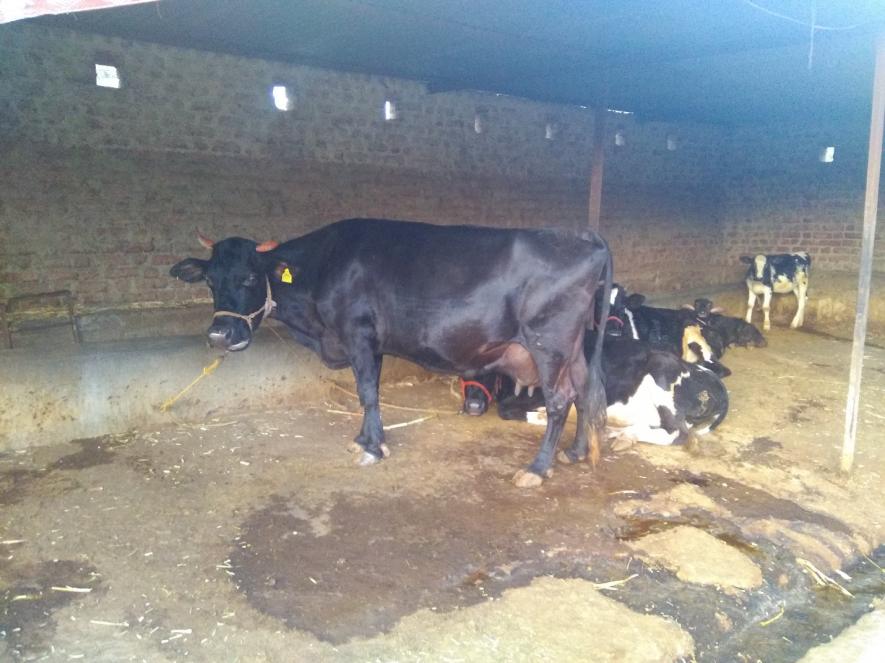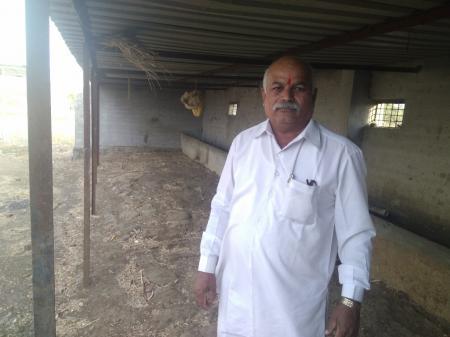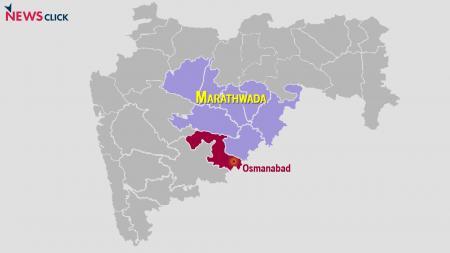#MahaDrought: Without Fodder Camps, Farmers Forced to Sell Cattle at Giveaway Prices

Cattle without fodder in Pakhrud village of Osmanabad.
Maharashtra is facing one of the most severe droughts since 1972, with the state government declaring drought in 180 tehsils out of 350. Entire Marathwada (spread across Southern and Eastern Maharashtra) region is in dire condition now. This is part 1 of the series of ground reports by Newsclick.

Datta Aasalkar sold his six cows for just about Rs 25,000 each.
Osmanabad: Datta Aasalkar (57) from Ieet village of Bhoom Tehsil in Osmanabad district had bought two cows in November 2018. Each cow costed Rs 70,000. However, due to dearth of the fodder, he had no option but to sell them. And not just those two. He sold all six of his cows. “I had to sell the six cows for just Rs 1,35,000 only. That comes to around Rs 25,000 per cow, meaning a loss of Rs 40,000-50,000,” said Datta. He had also built a cowshed by spending Rs five lakh, but it remains empty now.
This is one of many such stories coming from drought-hit Marathwada. Bhoom Tehsil of Osmanabad district is otherwise a rainfed area, and at the same time, it has been a tehsil recording the highest milk collection.
One needs to understand the paradox of milk collection and rainfed area to understand this crisis.

When farmers face issues including water shortage for their crops, they turn to ‘side businesses’. Dairy is one of the best income sources for them. In Bhoom tehsil alone, there are 89,000 animals, as per the data available with the state government. But the current drought is so severe that farmers have lost not only their crops, but they are also losing the cattle – the alternative source of income.
“I sold two of my cows. Each one could have been sold for Rs 70,000 otherwise. But I had no choice. I had to sell them for just Rs 30,000 this time,” said Shambhuraje Deshmukh of Ieet.
Despite the grim situation on the ground, the Maharashtra government has failed in opening fodder camps in the drought-hit areas. “There is a demand for 187 fodder camps in Bhoom tehsil alone. However, there is none right now,” said Samadhan Doke, local journalist.
Bhoom is Marathwada’s one of the largest milks producing tehsils with daily collection of over 3,50,000 litres of milk. “Farmers were looking at this business as the only income source available now. But now they are felling helpless,” said social activist Pratapbhaiyya Deshmukh from same Ieet village.
Also read: Maha Farmers Left Dismayed As Agricultural Produce Prices Crash
Fodder camps provide the backup that is necessary for the farmers to fight the drought. Due to the drought, farmers are being forced to rely on grass bundles in the open market. In the last week of February, one bundle of grass was being sold at a price of Rs 40. A cow would require at least six bundles of grass every day. So, the cost of just grass for each cow adds up to Rs 240 per day. Then comes the cost of other food required for the cows, which can be up to Rs 50 per day. Maintenance cost of each cow is Rs 10 per day. So, the total cost adds up to Rs 300 per day.
On the other hand, the milk production per cow on average is 15 liters, say the farmers. As of now, the market rate of the cow milk is Rs 20 per litre. So, the total daily income of the farmers comes to only Rs 300. “Humare pass is me bachata kya hai aap batao? 300 rupaiyya kamate hai, 300 rupaye ki laagat hai, fir hum kya khaye? (How can we save anything from this? We earn Rs 300 and spend Rs 300. What do we end up with to survive?),” asks Shivaji Barhate, a farmer from Pakharud village of Bhoom tehsil.
Farmers believe that if the state government opens fodder camps in the district, then the cost of fodder as well as of the labour for the water will be reduced, which will ultimately be a relief to the farmers. Newsclick met Appasaheb Chavan, 52-year-old farmer from Pakhrud village. He harvested his jowar crop to feed his two Jersey cows and one buffalo. “What else can I do? That jowar won’t make any money in market, and I don’t have grass left anymore in the field. I don’t have money to buy the bundles of grass from the market. So, I cut the jowar, and I’m feeding it to my cows,” said Appasaheb.
Newsclick tried to find the reason behind the delay in opening of the fodder camps. “Recently, district veterinary officer submitted a report to the government, which said that the district has green grass, and it will suffice till March 15. This is why no action has been taken on the proposal of the fodder camps,” said Mahaveer Jalan, senior local journalist. However, the ground reality is in complete contrast with the claim in the report.
Aasalkar told Newsclick: “Earlier, the state government used to start fodder camps by November end itself. This would prevent selling of animals at giveaway prices. That has changed now.”
Interestingly, Asalkar is a staunch supporter of the ruling party Shiv Sena. He had contested Zilla Parishad election on a Shiv Sena ticket in 2017. However, as he sits in his empty cowshed – bearing the brunt of the government’s apathy – he has no option but to acknowledge the failure of the Shiv Sena-BJP government in the state.
Also read: Maharashtra Farmers’ Movement: Four Leaders You Need to Know About
Get the latest reports & analysis with people's perspective on Protests, movements & deep analytical videos, discussions of the current affairs in your Telegram app. Subscribe to NewsClick's Telegram channel & get Real-Time updates on stories, as they get published on our website.























